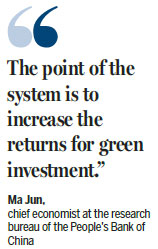
Around 90 percent of the funds needed to further develop China's environmental industry are expected to come from private sources, requiring a new financial system to encourage more funds into the sector.
Ma Jun, chief economist at the research bureau of the People's Bank of China, said this as he revealed the findings of a study on how best to manage such a fund-raising program. He said at the Eco Forum Global Annual Conference Guiyang 2015 Multinational Corporations Session in Beijing that China is expected to invest at least 2 trillion yuan ($320 billion) annually on the development of green industries.
"Based on the current situation, however, the government can afford only around 300 billion yuan, which means 85 percent to 90 percent of funding will have to come from private investment," Ma said.
Historically, the lack of effective mechanisms to encourage more investment in eco-friendly industries meant most funds flowed into profitable, yet highly polluting sectors instead.
Last month, Pan Gongsheng, deputy governor of the PBOC, the central bank, said it was drafting the 13th Five-Year Plan (2016-20) for financial reform in which a green financial system will play an integral part.
Ma's research proposes 14 measures to establish a green finance system in China, such as creating green banks, issuing more green bonds, and opening new channels for IPOs by green businesses.
"The point of the system is to increase the returns for green investment. It will also reduce the returns for polluting projects," he said.
For example, one of the proposed measures is to create a green banking system composed of national-level eco-development banks, local specialist banks that offer loans to the environmental industry as well as to standard commercial banks for their own environmental activities.
The creation of more green bonds, particularly, is also seen as an important way of raising funds for future environmentally friendly projects.
China issued the first-ever yuan-denominated green bond in June, by International Finance Corp in London, marking a further step forward in the internationalization of China's currency. The three-year bond raised 500 million yuan and was priced at a yield of 2 percent.
Proceeds from the bond will be used to provide funding for projects related to renewable energy and energy efficiency across developing economies. Also within those 14 proposals would be an emphasis on forcing polluting companies to pay more in compulsory green insurance-a way, Ma said, to cover the costs, for instance, of environmental accidents.
"In 2012 alone, there were 542 environmental accidents. Without compulsory insurance no one would have taken responsibility for the environmental damage," he said.
Christophe Bahuet, country director of the United Nations Development Program's Beijing office, said the creation of green finance tools is important for all developing nations.
The UN's latest World Investment Report showed that the developing world would have to spend between $3.3 trillion and $4.5 trillion to meet its sustainable development goals, but that a $2.5 trillion funding gap still exists in those plans.
Contact the writers at chengyingqi@chinadaily.com.cn and yangjun@chinadaily.com.cn
|
A tea plantation in Liping, Guizhou province, which is one of the green industries supported by the local government. China is expected to invest at least 2 trillion yuan ($320 billion) annually on the development of green industries. Provided To China Daily |
